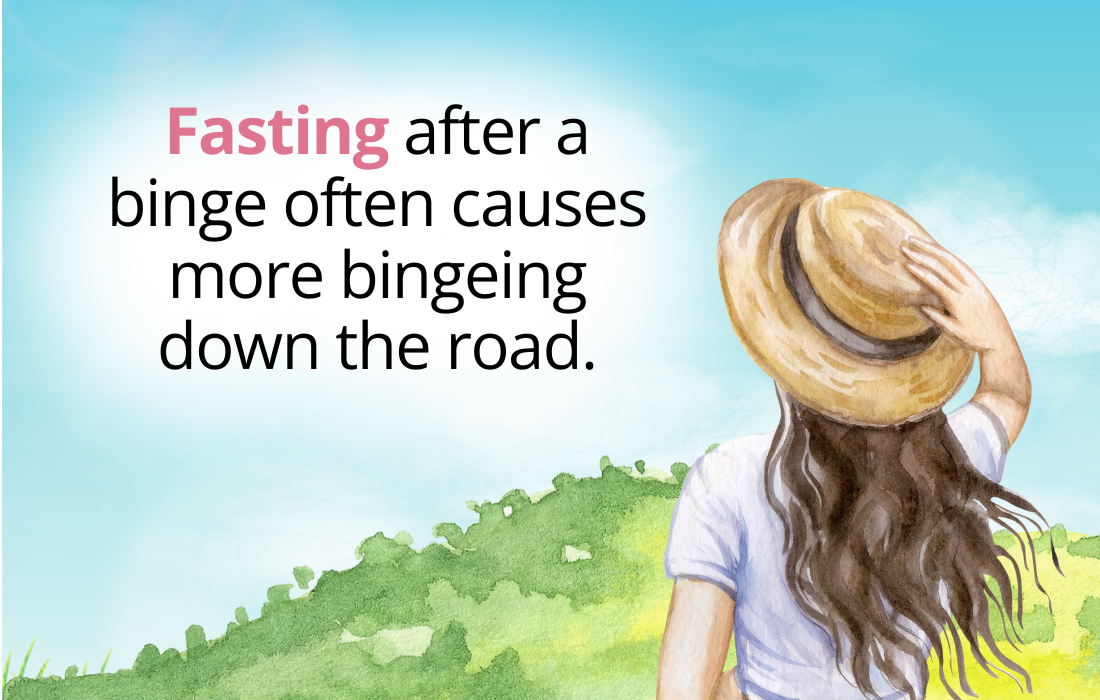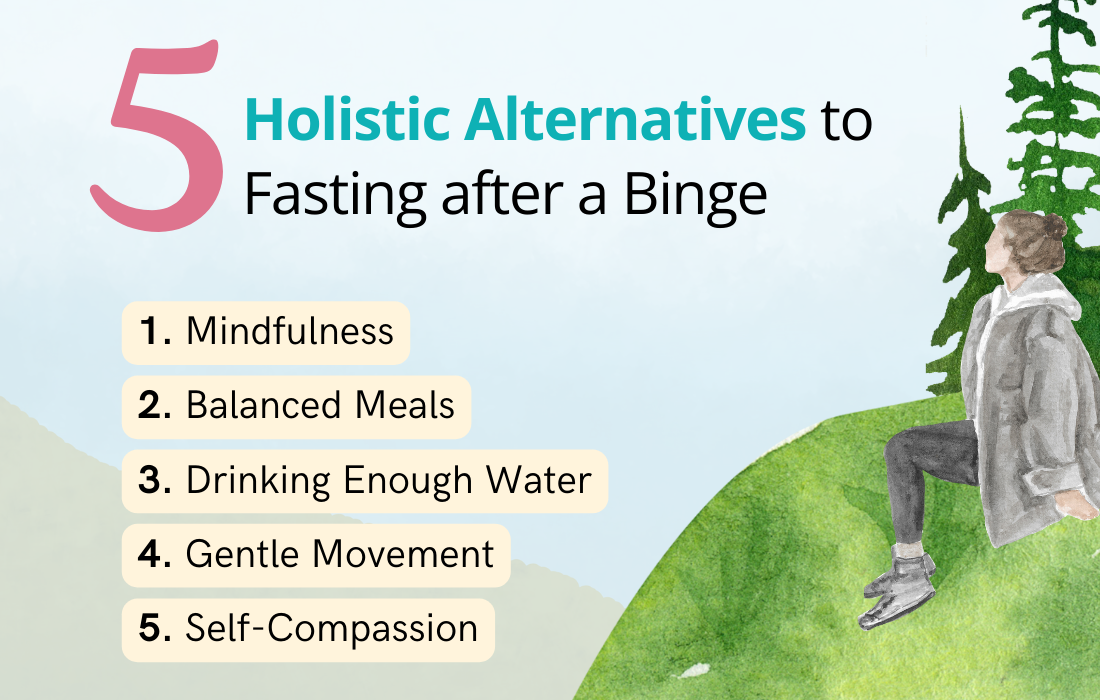Fasting After a Binge
“Should I fast after a binge?”
When I was battling bingeing, each and every binge was followed by the same thought: I should fast and eat as little as possible to make up for what I just ate.
Written by Jenn Hand, Holistic Nutritionist, Board Certified Health Coach, NBC-HWC
I deeply understand the desire to regain balance after a binge eating episode. Our desire for fasting is often just that–our only way we know how to feel in control. But is fasting right for you? Let’s explore this topic from a holistic perspective to provide clarity and guidance.
The Pitfalls of Fasting after a Binge
While fasting is a common strategy for calorie control and detoxification, it may not be the best choice after a binge.
Fasting can exacerbate feelings of deprivation and lead to a cycle of restrictive eating patterns, negatively impacting mental and emotional well-being. For those of us who’ve struggled with bingeing and food, fasting isn’t the best option. Although it’s a way for us to feel in “control,” it usually backfires, often causing more bingeing down the road.

Understanding Binge Eating
Binge eating is often accompanied by feelings of guilt, shame, and physical discomfort.
The deep despair we feel post binge is challenging. A part of our healing is approaching our binges with compassion and without judgment. Binges can stem from various factors, including emotional triggers, restrictive dieting, or hormonal imbalances.

Holistic Alternatives
1. Mindfulness
Focus on mindful eating practices to reconnect with your body’s hunger and fullness cues. Notice the desire to restrict and allow that old tape to be there. Remind yourself you are allowed to fuel your body the next time it’s hungry.
2. Aim for balance
Prioritize balanced meals with lean proteins, healthy fats, complex carbohydrates, and plenty of vegetables and fruits. This approach supports stable blood sugar levels and overall well-being.
3. Hydration
Drink adequate water to support digestion and hydration. Make a cup of hot herbal teas to soothe and nourish yourself as you recover from a binge.
4. Gentle movement
Engage in gentle movement such as yoga, walking, or stretching to promote physical and mental relaxation. This isn’t a “punishment” from your binge, but a way to help take care of yourself as you move through it.
5. Self-compassion
Our post binge thoughts are usually critical by default. But this never leads to lasting change. See if you can practice self-compassion and encouragement. Remind yourself that one binge does not define your worth or progress on your journey.
Common Questions about Fasting and Binge Eating
Can fasting help “reset” my digestive system after overeating?
For women who struggle with bingeing, I don’t recommend fasting. It’s better to re-balance yourself with hydration, nutritious meals, gentle walks, and self-care.
What are the risks of fasting after binge eating?
Risks can include nutrient deficiencies, metabolic slowdown, and reinforcing restrictive eating patterns that may contribute to disordered eating behaviors over time.
How can I take care of my body after a binge without fasting?
What are your favorite ways to take care of yourself? Post binge, mine was journaling 🙂
Show your body some love after a binge by drinking water, aiming for balanced meals, being mindful and cultivating kindness towards yourself.
What are some healthier ways to respond to binge eating?
Healthier ways to respond to binge eating include seeking support, learning how to deal with emotions without turning to food, making sure you’re eating enough (and enough protein!), and addressing underlying emotional triggers.
How do I break the cycle of binge eating and then wanting to fast?
Remind yourself that short term restriction only leads to overeating later.
What we desire is control and when we continue to stay in the binge/diet (fast) cycle, it keeps us stuck. The desire to fast may be there, as it is a pattern we’ve engaged in in the past, but it doesn’t mean we have to choose to do it this time!
What should I do instead of fasting to feel better after binge eating?
Instead of fasting, aim to nourish your body with nutritious foods, stay hydrated, practice self-care activities, and be kind to yourself.
Related Articles
⚪ How a Binge Eating Coach Can Help You to Stop Overeating and Feel Free Again
⚪ I Stopped Binge Eating. Here’s How I Did It.
⚪ How to Stop Bingeing at Night
Get the Normal Eater’s Newsletter
Join 8000+ women who are overcoming overeating, binge eating, and breaking up with dieting forever. Get Jenn’s inspiring and actionable weekly newsletter with the latest posts, podcasts, and tips on how to love your body, find food freedom, and lose weight holistically.
Get the Normal Eater’s NewsletterWork with an Emotional Eating & Holistic Nutrition Coach
Overcome Bingeing and Emotional Eating, and Break Up with Yo-yo Dieting
Working with an emotional eating coach and holistic nutritionist can help you get free from the frustrating binge and restrict cycle and stop yo-yo dieting.
You don’t have to be obsessed with food or have a million rules around eating to find your natural weight and learn to love your body. Ready to actually see a lasting change and experience true freedom?
Schedule a 20-min CallAbout the Author:

Jenn Hand has been helping women like you become normal eaters since 2015.
She’s worked with thousands of women, helping them to balance their bodies, end bingeing, stop obsessing over food, and start feeling amazing again. As a board-certified health coach and holistic nutritionist, Jenn knows how to support you in making real positive changes that last.
Her articles have been published on Mind Body Green, Tiny Buddha, Thrive Global and other local and global media platforms. She’s the author of How to Be a Normal Eater and the creator of The Normal Eater’s Club program. Listen to Jenn’s advice and tips on the Cake Doesn’t Count Podcast, or read more of her articles for free on the Food Freedom Blog.
Learn About Coaching!




